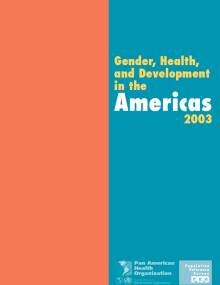Around the world, efforts to reduce poverty and enhance development have had greater success where women and men have relatively equal opportunities. In much of Latin America, however, women's low social status, poor health, and subordination to men persist. Governments in the region increasingly acknowledge the need to promote gender equity in health and other aspects of development, but the data to monitor disparities between men and women, and progress in closing the gaps have not been readily available.
This data sheet profiles gender differences in health and development in 48 countries in the Americas, focusing on women's reproductive health, access to key health services, and major causes of death. Its objective is to raise awareness of gender inequities in the region and to promote the use of sex-disaggregated health statistics for policies and programs. This effort is consistent with the United Nations' Millennium Development Goals, adopted by 189 member countries at the UN Millennium Summit (2000), which focus on achieving measurable improvements in people's lives, including greater gender equality.
The data sheet also provides basic population and development indicators and information on other factors that influence health, including education, employment, political participation, and risk factors. Staff of the Pan American Health Organization and the Population Reference Bureau compiled this information using data from official national sources as well as data collected by specialized international agencies.
|

